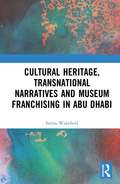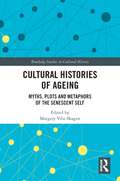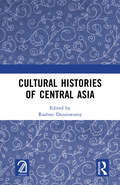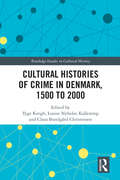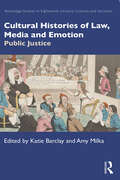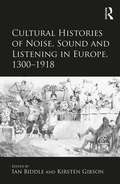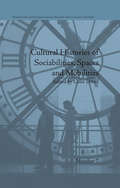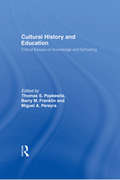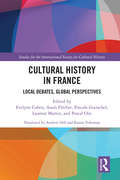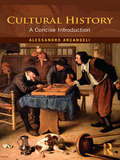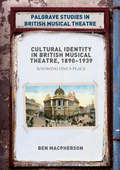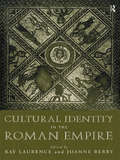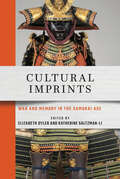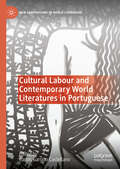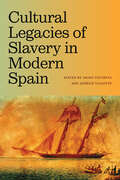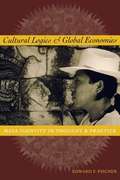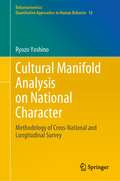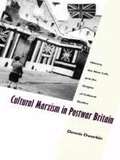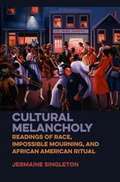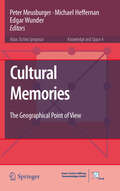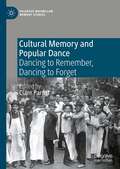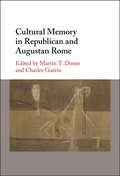- Table View
- List View
Cultural Heritage, Transnational Narratives and Museum Franchising in Abu Dhabi
by Sarina WakefieldThis publication contributes to new understandings of how heritage operates as a global phenomenon and the transnational heritage discourses that emerge from this process. Taking such a view sees autochthonous and franchised heritage not as separate or opposing elements but as part of the same process of contemporary globalised identity-making, which contributes to the development of newly emergent cosmopolitan identities. The book critically examines the processes that are involved in the franchising of heritage and its cultural effects. It does so by examining the connections and tensions that emerge from combining autochthonous and franchised heritage in the United Arab Emirates, providing a unique window in to the process of creating hybrid heritage in non-Western contexts. It develops new ideas about how this global phenomenon works, how it might be characterised and how it influences and is itself affected by local forms of heritage. By exploring how autochthonous and franchised heritage is produced in Abu Dhabi in the United Arab Emirates it becomes clear that Western-dominated practices are often challenged and, perhaps more importantly, that new ways of understanding, producing and living with heritage are being articulated in these previously marginal locations. The book offers innovative insights into heritage as a transnational process, exploring how it operates within local, national and international identity concerns and debates. It will appeal to scholars and students interested in critical heritage studies, museums, tourism, cultural studies and Middle Eastern studies.
Cultural Histories of Ageing: Myths, Plots and Metaphors of the Senescent Self (Routledge Studies in Cultural History #102)
by Margery Vibe SkagenDrawing on sixteenth- to twenty-first-century American, British, French, German, Polish, Norwegian and Russian literature and philosophy, this collection teases out culturally specific conceptions of old age as well as subjective constructions of late-life identity and selfhood. The internationally known humanistic gerontologist Jan Baars, the prominent historian of old age David Troyansky and the distinguished cultural historian and pioneer in the field of literature and science George Rousseau join a team of literary historians who trace out the interfaces between their chosen texts and the respective periods’ medical and gerontological knowledge. The chapters’ in-depth analyses of major and less-known works demonstrate the rich potential of fiction, poetry and autobiographical writing in the construction of a cultural history of senescence. These literary examples not only bear witness to longue durée representations of old age, and epochal transitions regarding cultural attitudes to the aged; they also foreground the subjectivities that produced some of these representations and that continue to communicate with readers of other times and places. By casting a net over a variety of authors, genres, periods and languages, the collection gives a broad sense of how literature is among the richest and most engaging sources for historicizing the ageing self.
Cultural Histories of Central Asia
by Rashmi DoraiswamyCentral Asia, the 'heart' of the Eurasian landmass, has through the centuries been the hub of diverse and varied cultures. These cultures have encompassed pre-Islamic religions and Islam, sedentary and nomadic lifestyles and lived through rapid transitions from feudal, capitalist and socialist economies, from Tsarist to Soviet and post-Soviet formations. The essays in this volume examine the cultural exchanges and encounters that have occurred in the region through a vast timeline that extends from the premedieval to the medieval and modern periods. The writers are academics, as well as art practitioners and independent researchers who belong to a wide spectrum of disciplines: Central Asian and Russian Studies, Architecture, Ethno-Musicology, History, Painting, Film Studies, Art History, Textiles, Literature and International Relations. The volume presents a colourful mosaic of views on the many cultural histories of Central Asia.
Cultural Histories of Crime in Denmark, 1500 to 2000 (Routledge Studies in Cultural History #55)
by Louise Nyholm Kallestrup Tyge Krogh Claus Bundgård ChristensenTaking the kingdom of Denmark as its frame of reference, this volume presents a range of close analyses that shed light on the construction and deconstruction of crime and criminals, on criminal cultures and on crime control from 1500 to 2000. Historically, there have been major changes in the legal definition of those acts that are legally defined as being criminal offences – and of those that are not. This volume explores the criteria and perceptions underlying definitions of crime in a powerful and absolutist Lutheran state and subsequently in a Denmark characterised by social welfare and sexual liberation. It places special focus on moral issues rooted in considerations of religion and sexuality.
Cultural Histories of Law, Media and Emotion: Public Justice (Routledge Studies in Eighteenth-Century Cultures and Societies)
by Katie BarclayCultural Histories of Law, Media and Emotion: Public Justice explores how the legal history of long-eighteenth-century Britain has been transformed by the cultural turn, and especially the associated history of emotion. Seeking to reflect on the state of the field, 13 essays by leading and emerging scholars bring cutting-edge research to bear on the intersections between law, print culture and emotion in Britain across the eighteenth and nineteenth centuries. Divided into three sections, this collection explores the ‘public’ as a site of legal sensibility; it demonstrates how the rhetoric of emotion constructed the law in legal practice and in society and culture; and it highlights how approaches from cultural and emotions history have recentred the individual, the biography and the group to explain long-running legal-historical problems. Across this volume, authors evidence how engagements between cultural and legal history have revitalised our understanding of law’s role in eighteenth-century culture and society, not least deepening our understanding of justice as produced with and through the public. This volume is the ideal resource for upper-level undergraduates, postgraduates and scholars interested in the history of emotions as well as the legal history of Britain from the late seventeenth to the nineteenth century.
Cultural Histories of Law, Media and Emotion: Public Justice (Routledge Studies in Eighteenth-Century Cultures and Societies)
by Katie BarclayCultural Histories of Law, Media and Emotion: Public Justice explores how the legal history of long-eighteenth-century Britain has been transformed by the cultural turn, and especially the associated history of emotion.Seeking to reflect on the state of the field, 13 essays by leading and emerging scholars bring cutting-edge research to bear on the intersections between law, print culture and emotion in Britain across the eighteenth and nineteenth centuries. Divided into three sections, this collection explores the ‘public’ as a site of legal sensibility; it demonstrates how the rhetoric of emotion constructed the law in legal practice and in society and culture; and it highlights how approaches from cultural and emotions history have recentred the individual, the biography and the group to explain long-running legal-historical problems. Across this volume, authors evidence how engagements between cultural and legal history have revitalised our understanding of law’s role in eighteenth-century culture and society, not least deepening our understanding of justice as produced with and through the public.This volume is the ideal resource for upper-level undergraduates, postgraduates and scholars interested in the history of emotions as well as the legal history of Britain from the late seventeenth to the nineteenth century.
Cultural Histories of Noise, Sound and Listening in Europe, 1300-1918: )
by Ian Biddle Kirsten GibsonCultural Histories of Noise, Sound and Listening in Europe, 1300-1918 presents a range of historical case studies on the sounding worlds of the European past. The chapters in this volume explore ways of thinking about sound historically, and seek to understand how people have understood and negotiated their relationships with the sounding world in Europe from the Middle Ages through to the early twentieth century. They consider, in particular: sound and music in the later Middle Ages; the politics of sound in the early modern period; the history of the body and perception during the Ancien Régime; and the sounds of the city in the nineteenth century and sound and colonial rule at the fin de siècle. The case studies also range in geographical orientation to include considerations not only of Britain and France, the countries most considered in European historical sound studies in English-language scholarship to date, but also Bosnia-Herzegovina, British Colonial India, Germany, Italy and Portugal. Out of this diverse group of case studies emerge significant themes that recur time and again, varying according to time and place: sound, power and identity; sound as a marker of power or violence; and sound, physiology and sensory perception and technologies of sound, consumption and meaning.
Cultural Histories of Sociabilities, Spaces and Mobilities (Studies for the International Society for Cultural History #7)
by Colin DivallFor the majority of us the opportunity to travel has never been greater, yet differences in mobility highlight inequalities that have wider social implications. Exploring how and why attitudes towards movement have evolved across generations, the case studies in this essay collection range from medieval to modern times and cover several continents.
Cultural History and Education: Critical Essays on Knowledge and Schooling
by Thomas PopkewitzCultural History and Education brings together an outstanding group of the leading scholars in the study of the cultural history of education. These scholars, whose work represents a variety of national contexts from throughout Europe, Latin America, and North America, contribute to a growing body of work that seeks to re-think historical studies i
Cultural History in France: Local Debates, Global Perspectives (Studies for the International Society for Cultural History)
by Andrew Hill Evelyne Cohen Anaïs Fléchet Pascale Gœtschel Laurent Martin Pascal Ory Rosine FefermanThis volume, which gathers contributions presented at the annual conferences of l'Association pour le développement de l'histoire culturelle (ADHC), questions the subjects and boundaries of cultural history in France – with regard to neighboring approaches such as cultural studies, media studies, and gender studies – to elaborate a "social history of representations." Historians, philosophers and sociologists address a large variety of topics and methodological proposals. Definitions, objects and actors, memories and cultural transfers: this book depicts the major questions that underlie the historical debate at the beginning of the 21st century.
Cultural History of Modern India
by Dilip M. MenonThe history of modern India has been narrated largely in terms of the Nationalist Movement, personalities and what has been seen as the 'high' politics of the state.
Cultural History: A Concise Introduction
by Alessandro ArcangeliThe expression ‘cultural history’ is generally used today to signal a particular approach to history, one which could be applied to any object, and is mainly concerned with the sense men and women from the past gave to the world they lived in. In this introduction to cultural history as a subdiscipline, the reader will find the key steps in the historical development of the field from 1850 to the present. It surveys different ways in which cultural history has been practised, exploring intellectual history, the history of ideas and concepts, of mentalities, of symbols and representations, and of languages and discourses. Cultural History also maps the territory cultural history most effectively enlightens: gender; the family and sexuality; the body; senses and emotions and images; material culture and consumption; the media and communication. Lastly, it includes an appendix of biographies of a number of influential cultural historians. This concise and accessible introduction will be an essential volume for any university student studying cultural history.
Cultural Identity in British Musical Theatre, 1890–1939: Knowing One's Place (Palgrave Studies In British Musical Theatre Ser.)
by Ben MacphersonThis book examines the performance of ‘Britishness’ on the musical stage. Covering a tumultuous period in British history, it offers a fresh look at the vitality and centrality of the musical stage, as a global phenomenon in late-Victorian popular culture and beyond. Through a re-examination of over fifty archival play-scripts, the book comprises seven interconnected stories told in two parts. Part One focuses on domestic and personal identities of ‘Britishness’, and how implicit anxieties and contradictions of nationhood, class and gender were staged as part of the popular cultural condition. Broadening in scope, Part Two offers a revisionary reading of Empire and Otherness on the musical stage, and concludes with a consideration of the Great War and the interwar period, as musical theatre performed a nostalgia for a particular kind of ‘Britishness’, reflecting the anxieties of a nation in decline.
Cultural Identity in the Roman Empire
by Ray Laurence Joanne BerryThis provocative and often controversial volume examines concepts of ethnicity, citizenship and nationhood, to determine what constituted cultural identity in the Roman Empire. The contributors draw together the most recent research and use diverse theoretical and methodological perspectives from archaeology, classical studies and ancient history to challenge our basic assumptions of Romanization and how parts of Europe became incorporated into a Roman culture.Cultural Identity in the Roman Empire breaks new ground, arguing that the idea of a unified and easily defined Roman culture is over-simplistic, and offering alternative theories and models. This well-documented and timely book presents cultural identity throughout the Roman empire as a complex and diverse issue, far removed from the previous notion of a dichotomy between the Roman invaders and the Barbarian conquered.
Cultural Imprints: War and Memory in the Samurai Age
by Elizabeth OylerCultural Imprints draws on literary works, artifacts, performing arts, and documents that were created by or about the samurai to examine individual "imprints," traces holding specifically grounded historical meanings that persist through time. The contributors to this interdisciplinary volume assess those imprints for what they can suggest about how thinkers, writers, artists, performers, and samurai themselves viewed warfare and its lingering impact at various points during the "samurai age," the long period from the establishment of the first shogunate in the twelfth century through the fall of the Tokugawa in 1868. The range of methodologies and materials discussed in Cultural Imprints challenges a uniform notion of warrior activity and sensibilities, breaking down an ahistorical, monolithic image of the samurai that developed late in the samurai age and that persists today. Highlighting the memory of warfare and its centrality in the cultural realm, Cultural Imprints demonstrates the warrior's far-reaching, enduring, and varied cultural influence across centuries of Japanese history.Contributors: Monica Bethe, William Fleming, Andrew Goble, Thomas Hare, Luke Roberts, Marimi Tateno, Alison Tokita, Elizabeth Oyler, Katherine Saltzman-Li
Cultural Labour and Contemporary World Literatures in Portuguese (New Comparisons in World Literature)
by Carlos Garrido CastellanoThis book examines the evolution of contemporary narrative in Portuguese from the point of view of cultural labour. The main objective of this volume is to analyse the panorama of contemporary literary fiction in Portuguese under the prism of the economization of cultural creativity and the expansion of neoliberal understanding of creative subjectivity and self-realization. Assuming that neoliberalism still constitutes a haunting presence that becomes present in ways that are far from universal and homogeneous and that are shaped by coloniality, this book expands the debates on cultural labour and literary materialisms beyond European and North American contexts. Dealing with contemporary literary production from Brazil, Portugal, Angola, Mozambique, Cabo Verde, Macau, Canada and Goa, the volume also tries to reimagine issues of cultural labour and the expansion of artistic modes of self-definition from the point of view of contemporary literary production in Portuguese.
Cultural Legacies of Slavery in Modern Spain (SUNY series in Latin American and Iberian Thought and Culture)
by Akiko Tsuchiya Aurélie VialetteThis groundbreaking volume explores how culture produced in Spain, from the nineteenth century to the present, both reflects and shapes ways of understanding the history and heritage of a nation sustained by colonialism and slavery. Akiko Tsuchiya and Aurélie Vialette bring together an outstanding group of scholars, artists, cultural producers, and activists in a range of fields—from history to literary studies, anthropology to journalism, and flamenco to film. Drawing on interdisciplinary and comparative methodologies, contributors address the legacies of slavery in the archive; in cultural memory sites; and in literature, music, and visual arts. How, they ask, do different cultural forms and institutions represent and reckon with this past and push for justice in the face of persistent racial discrimination? In its focus on collective memory and the cultural afterlives of slavery and antislavery, Cultural Legacies of Slavery in Modern Spain will appeal not only to Iberian and Latin American specialists but also readers across Afro-Hispanic, postcolonial, transatlantic, and critical race studies.
Cultural Logics and Global Economies: Maya Identity in Thought and Practice
by Fischer Edward F.Drawing on recent theories from cognitive studies, interpretive ethnography, and political economy, Edward F. Fischer looks at individual Maya activists and local cultures, as well as changing national and international power relations, to understand how ethnic identities are constructed and expressed in the modern world. At the global level, he shows how structural shifts in international relations have opened new venues of ethnic expression for Guatemala's majority Maya population. At the local level, he examines the processes of identity construction in two Kaqchikel Maya towns, Tecpán and Patzún, and shows how divergent local norms result in different conceptions and expressions of Maya-ness, which nonetheless share certain fundamental similarities with the larger pan-Maya project. Tying these levels of analysis together, Fischer argues that open-ended Maya "cultural logics" condition the ways in which Maya individuals (national leaders and rural masses alike) creatively express their identity in a rapidly changing world.
Cultural Manifold Analysis on National Character: Methodology of Cross-National and Longitudinal Survey (Behaviormetrics: Quantitative Approaches to Human Behavior #10)
by Ryozo YoshinoThis book first presents an overview of the history of a national character survey by the Institute of Statistical Mathematics that has been conducted for more than 65 years. The Japanese National Character Survey, launched in 1953, is a rare longitudinal survey in the world of survey research based on rigorous statistical sampling theory, motivating other countries to launch similar longitudinal surveys, including the General Social Survey (GSS), the Allgemeine Bevölkerungsumfrage der Sozialwissenschaften (ALLBUS, German General Social Survey (GGSS)), Eurobarometer, and others. Since the early 1970s, the Japanese survey has been extended as a cross-national survey for more advanced research of the Japanese national character in a comparative context. Second, the book explains the paradigm of cross-national studies called the Cultural Manifold Analysis (CULMAN), developed in the longitudinal and cross-national surveys, with practical examples of analysis. This explanation will help helps a wide range of readers to better understand the cross-national comparative surveys of attitudes, opinion, and social values as basic information for evidence-based policymaking and research.
Cultural Marxism in Postwar Britain: History, the New Left, and the Origins of Cultural Studies
by Dennis DworkinIn this intellectual history of British cultural Marxism, Dennis Dworkin explores one of the most influential bodies of contemporary thought. Tracing its development from beginnings in postwar Britain, through its various transformations in the 1960s and 1970s, to the emergence of British cultural studies at Birmingham, and up to the advent of Thatcherism, Dworkin shows this history to be one of a coherent intellectual tradition, a tradition that represents an implicit and explicit theoretical effort to resolve the crisis of the postwar British Left.Limited to neither a single discipline nor a particular intellectual figure, this book comprehensively views British cultural Marxism in terms of the dialogue between historians and the originators of cultural studies and in its relationship to the new left and feminist movements. From the contributions of Eric Hobsbawm, Christopher Hill, Rodney Hilton, Sheila Rowbotham, Catherine Hall, and E. P. Thompson to those of Perry Anderson, Barbara Taylor, Raymond Williams, Dick Hebdige, and Stuart Hall, Dworkin examines the debates over issues of culture and society, structure and agency, experience and ideology, and theory and practice. The rise, demise, and reorganization of journals such as The Reasoner, The New Reasoner, Universities and Left Review, New Left Review, Past and Present, are also part of the history told in this volume. In every instance, the focus of Dworkin's attention is the intellectual work seen in its political context. Cultural Marxism in Postwar Britain captures the excitement and commitment that more than one generation of historians, literary critics, art historians, philosophers, and cultural theorists have felt about an unorthodox and critical tradition of Marxist theory.
Cultural Materialism: The Struggle for a Science of Culture
by Marvin HarrisFirst published in 1968, Harris's book has been cited in over 1,000 works and is one of the key documents explaining cultural materialism, the theory associated with Harris's work. This updated edition includes the complete 1968 text plus a new introduction by the author, which discusses the impact of the book and highlights some of the major trends in anthropological theory since its original publication. RAT, as it is affectionately known to three decades of graduate students, comprehensively traces the history of anthropology and anthropological theory, culminating in a strong argument for the use of a scientific, behaviorally-based, ethic approach to the understanding of human culture known as cultural materialism
Cultural Melancholy: Readings of Race, Impossible Mourning, and African American Ritual
by Jermaine SingletonA daring cultural and literary studies investigation, Cultural Melancholy explores the legacy of unresolved grief produced by ongoing racial oppression and resistance in the United States. Using acute analysis of literature, drama, musical performance, and films, Singleton demonstrates how rituals of racialization and resistance transfer and transform melancholy discreetly across time, consolidating racial identities and communities along the way. He also argues that this form of impossible mourning binds racialized identities across time and social space by way of cultural resistance efforts. Singleton develops the concept of "cultural melancholy" as a response to scholarship that calls for the separation of critical race studies and psychoanalysis, excludes queer theoretical approaches from readings of African American literatures and cultures, and overlooks the status of racialized performance culture as a site of serious academic theorization. In doing so, he weaves critical race studies, psychoanalysis, queer theory, and performance studies into conversation to uncover a host of hidden dialogues--psychic and social, personal and political, individual and collective--for the purpose of promoting a culture of racial grieving, critical race consciousness, and collective agency. Wide-ranging and theoretically bold, Cultural Melancholy counteracts the racial legacy effects that plague our twenty-first century multiculture.
Cultural Memories: The Geographical Point of View (Knowledge and Space #4)
by Michael Heffernan Peter Meusburger Edgar WunderThe revival of interest in collective cultural memories since the 1980s has been a genuinely global phenomenon. Cultural memories can be defined as the social constructions of the past that allow individuals and groups to orient themselves in time and space. The investigation of cultural memories has necessitated an interdisciplinary perspective, though geographical questions about the spaces, places, and landscapes of memory have acquired a special significance. The essays in this volume, written by leading anthropologists, geographers, historians, and psychologists, open a range of new interpretations of the formation and development of cultural memories from ancient times to the present day. The volume is divided into five interconnected sections. The first section outlines the theoretical considerations that have shaped recent debates about cultural memory. The second section provides detailed case studies of three key themes: the founding myths of the nation-state, the contestation of national collective memories during periods of civil war, and the oral traditions that move beyond national narrative. The third section examines the role of World War II as a pivotal episode in an emerging European cultural memory. The fourth section focuses on cultural memories in postcolonial contexts beyond Europe. The fifth and final section extends the study of cultural memory back into premodern tribal and nomadic societies.
Cultural Memory and Popular Dance: Dancing to Remember, Dancing to Forget (Palgrave Macmillan Memory Studies)
by Clare ParfittThis book focuses on the myriad ways that people collectively remember or forget shared pasts through popular dance. In dance classes, nightclubs, family celebrations, tourist performances, on television, film, music video and the internet, cultural memories are shared and transformed by dancing bodies adapting yesterday’s steps to today’s concerns. The book gathers emerging and seasoned scholarly voices from a wide range of geographical and disciplinary perspectives to discuss cultural remembering and forgetting in diverse popular dance contexts. The contributors ask: how are Afro-diasporic memories invoked in popular dance classes? How are popular dance genealogies manipulated and reclaimed? What is at stake for the nation in the nationalizing of folk and popular dances? And how does mediated dancing transmit memory as feelings or affects? The book reveals popular dance to be vital to cultural processes of remembering and forgetting, allowing participants to pivot between alternative pasts, presents and futures.
Cultural Memory in Republican and Augustan Rome
by Martin T. Dinter Charles GuérinCultural memory is a framework which elucidates the relationship between the past and the present: essentially, why, how, and with what results certain pieces of information are remembered. This volume brings together distinguished classicists from a variety of sub-disciplines to explore cultural memory in the Roman Republic and the Age of Augustus. It provides an excellent and accessible starting point for readers who are new to the intersection between cultural memory theory and ancient Rome, whilst also appealing to the seasoned scholar. The chapters delve deep into memory theory, going beyond the canonical texts of Jan Assmann and Pierre Nora and pushing their terminology towards Basu's dispositifs, Roller's intersignifications, Langlands' sites of exemplarity, and Erll's horizons. This innovative framework enables a fresh analysis of both fragmentary texts and archaeological phenomena not discussed elsewhere.
